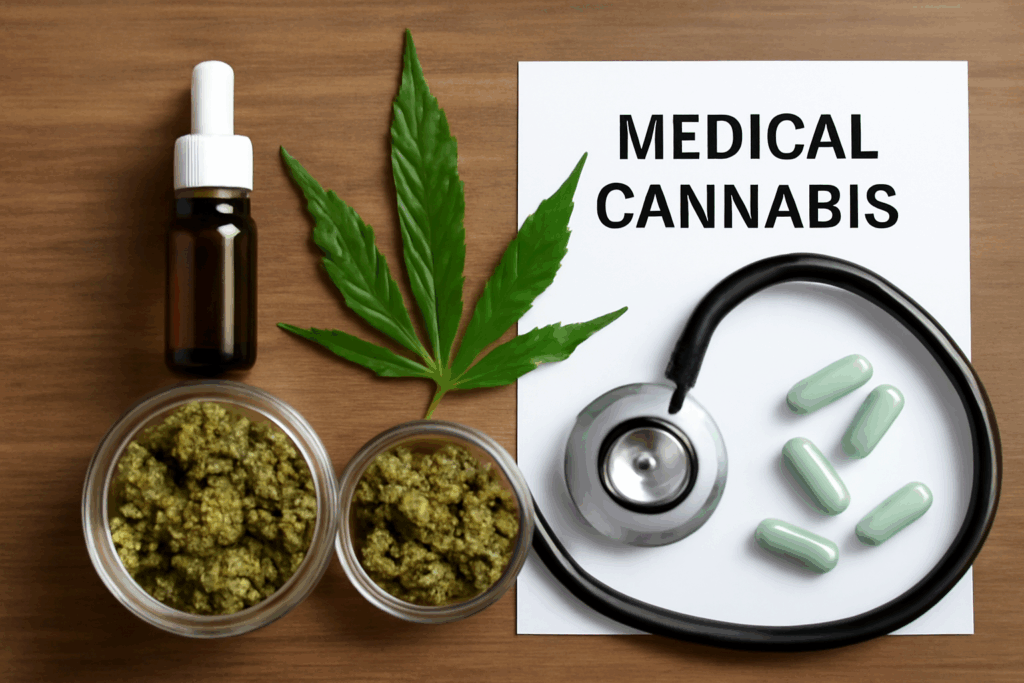Article Content:
The relationship between mental health and medical marijuana has been the subject of increasing scientific curiosity and public interest over the past decade. Once dismissed as purely recreational, cannabis has gained medical legitimacy for a range of physical and psychological conditions. Among its most promising applications is the management of anxiety, post-traumatic stress disorder (PTSD), and depression — three of the most common and debilitating mental health challenges today.
Understanding Medical Cannabis
Medical cannabis, or medicinal marijuana, refers to the controlled use of cannabis and its active compounds — cannabinoids — for therapeutic purposes. The two most studied cannabinoids are tetrahydrocannabinol (THC) and cannabidiol (CBD).
THC is psychoactive, responsible for the “high” associated with cannabis, while CBD is non-intoxicating and known for its calming, anti-inflammatory, and neuroprotective properties. In medical settings, these compounds interact with the endocannabinoid system (ECS) — a complex network of receptors in the brain and body that helps regulate mood, stress response, and emotional processing.
By influencing this system, cannabinoids can restore balance in neurochemical pathways involved in anxiety and mood regulation, potentially offering relief for those whose mental health conditions have resisted conventional treatment.
Legal Status and Regulation
Globally, attitudes toward medical cannabis are shifting rapidly. Countries like Canada, Germany, and Israel have established comprehensive frameworks for medicinal use, while the United States allows it in over 30 states under varying degrees of regulation.
In Australia, medical cannabis became legal in 2016 through the Narcotic Drugs Amendment Act, allowing regulated cultivation and production for therapeutic use. Access is managed through the Therapeutic Goods Administration (TGA) via the Special Access Scheme (SAS) or the Authorised Prescriber Scheme, ensuring patient safety and medical oversight.
Although stigma remains, over 300,000 Australians have been prescribed medicinal marijuana since legalization — with mental health-related conditions, such as anxiety, depression, and PTSD, becoming increasingly common reasons for approval.
Medical Cannabis and Mental Health: How It Works
Mental health disorders such as anxiety and depression often stem from imbalances in neurotransmitters like serotonin, dopamine, and GABA. The body’s endocannabinoid system interacts with these neurotransmitters, helping to regulate emotional stability, motivation, and relaxation.
CBD, in particular, appears to modulate the brain’s response to stress and fear. It binds indirectly to serotonin receptors (5-HT1A) and may reduce excessive neural activity in regions associated with anxiety and hypervigilance, such as the amygdala.
Meanwhile, THC may help alleviate intrusive memories or nightmares in patients with PTSD, although high doses can sometimes worsen anxiety symptoms. Therefore, careful formulation — often balancing CBD and THC — is crucial to maximize benefits and minimize risks.
Medical Cannabis for Anxiety
Anxiety disorders are among the most common mental health conditions worldwide. Traditional medications such as benzodiazepines or SSRIs can be effective but often come with side effects or dependency risks.
A growing body of research suggests CBD may provide anxiety relief without these drawbacks. In a 2019 study published in The Permanente Journal, nearly 80% of patients with anxiety reported decreased symptoms within the first month of using CBD oil, with minimal side effects.
Patients describe feeling calmer, more focused, and less overwhelmed by stress triggers. However, individual responses vary, and medical supervision remains essential to determine optimal dosing and cannabinoid ratios.
Medical Cannabis for PTSD
Post-traumatic stress disorder affects individuals who have experienced trauma, such as veterans, accident survivors, or abuse victims. Symptoms include flashbacks, insomnia, hyperarousal, and emotional numbness.
Cannabis in healthcare settings is increasingly used to manage PTSD symptoms by reducing intrusive thoughts and promoting better sleep. Studies from the Multidisciplinary Association for Psychedelic Studies (MAPS) found that medical cannabis helped PTSD patients sleep longer and experience fewer nightmares.
In Australia, PTSD is one of the approved indications for medicinal marijuana under the TGA’s Special Access Scheme. Some patients report regaining emotional control and improved quality of life after consistent, medically supervised treatment.
Medical Cannabis for Depression
Depression involves dysregulation of the brain’s reward and stress systems. While traditional antidepressants work on serotonin pathways, cannabinoids target both serotonin and endocannabinoid networks, potentially enhancing mood regulation more holistically.
CBD may exert antidepressant-like effects by boosting anandamide — often called the “bliss molecule” — which plays a role in emotional well-being. A 2020 review in Frontiers in Psychiatry suggested that CBD could reduce depressive behaviors in both preclinical and clinical models, especially when combined with therapy and lifestyle modifications.
However, excessive THC consumption can, in some cases, worsen depression, especially in individuals predisposed to mood disorders. Therefore, professional dosing and follow-up are vital.
Responsible Use and Potential Risks
Despite promising benefits, medical cannabis is not a cure-all. Responsible use of cannabis in healthcare requires careful consideration of dosage, formulation, and patient history.

Potential side effects include:
- Drowsiness or fatigue
- Impaired coordination or focus (in THC-dominant strains)
- Dry mouth or dizziness
- Mood fluctuations
- Increased anxiety with overuse
Additionally, long-term heavy THC use can impact memory or motivation in some individuals. Hence, medical cannabis should always be prescribed by a qualified practitioner who tailors treatment to each patient’s specific needs.
CBD-dominant products are often recommended for mental health conditions, as they offer therapeutic effects without intoxication or addiction risk.
Ethical Considerations in Prescribing
The use of medicinal marijuana in mental health care raises ethical questions about safety, accessibility, and patient autonomy. Clinicians must ensure their recommendations are evidence-based, transparent, and free from commercial influence.
Key ethical responsibilities include:
- Fully informing patients of potential risks and benefits
- Ensuring cannabis is not used as a first-line treatment when conventional therapies may suffice
- Preventing misuse or dependency through regular monitoring
- Advocating for equal access to safe, affordable medical cannabis
Stigma reduction is also an ethical concern. Many patients hesitate to seek help due to outdated perceptions of cannabis use. Open, fact-based communication is essential for building trust and ensuring patients receive compassionate, evidence-informed care.
Research and Patient Case Examples
In a 2021 Australian survey, over 70% of patients using medical cannabis reported improved anxiety and mood symptoms after three months of treatment. Another study in Journal of Affective Disorders found that patients with depression and PTSD experienced measurable improvements in sleep and emotional regulation after adding CBD oil to their treatment regimen.
For example, an Australian veteran diagnosed with chronic PTSD described that a balanced THC:CBD oil significantly reduced his flashbacks and improved sleep quality, allowing him to participate more fully in therapy. Such anecdotal evidence, while not a substitute for large-scale trials, supports continued exploration into cannabis in healthcare.
The Future of Cannabis in Mental Health
As medical research expands, the role of cannabis in treating anxiety, PTSD, and depression is likely to grow. Scientists are now studying targeted cannabinoid therapies, exploring how specific ratios or delivery methods can optimize symptom relief.
Australia continues to lead regional research through institutions like the Lambert Initiative for Cannabinoid Therapeutics, which focuses on cannabinoid-based interventions for both physical and mental health disorders.
The future of cannabis in healthcare will depend on maintaining a balance between innovation, regulation, and ethics — ensuring that patients receive treatments that are both safe and effective.
Conclusion
Medical cannabis represents a new frontier in mental health treatment — one that blends ancient botanical wisdom with modern neuroscience. For many patients, it offers hope where conventional medications have fallen short. However, responsible use of cannabis, guided by medical professionals, remains essential to ensure safety and efficacy.
As research deepens and stigma fades, medicinal marijuana could become an integral part of holistic mental health care — offering calm, clarity, and control to those living with anxiety, PTSD, or depression.
FAQS
Yes, medical cannabis is legal under Australia’s Therapeutic Goods Administration (TGA) framework. PTSD is one of the approved conditions, and eligible patients can access treatment through an authorized prescriber or the Special Access Scheme.
Yes, CBD-dominant medical cannabis has shown promising results in reducing anxiety by calming the nervous system and promoting relaxation. However, professional supervision is essential to ensure proper dosage and avoid overuse of THC, which can sometimes increase anxiety.
Medical cannabis, particularly CBD, interacts with the brain’s serotonin and endocannabinoid systems to enhance mood stability and reduce depressive symptoms. It’s often used as a complementary therapy alongside traditional antidepressants and counseling.
Possible side effects include drowsiness, dizziness, or mild mood changes. THC-heavy products can occasionally worsen anxiety or cause temporary cognitive impairment, so it’s important to use prescribed doses under medical supervision.

